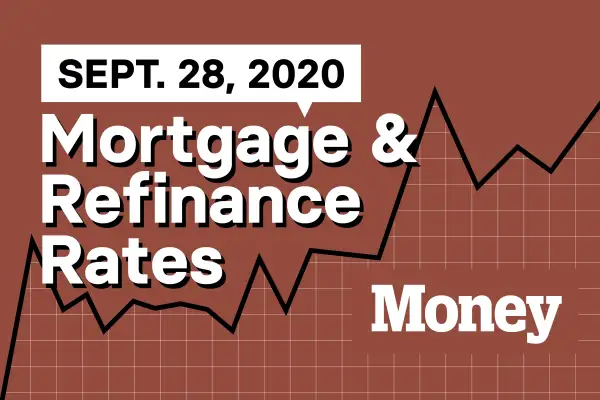Here Are Today's Best Mortgage & Refinance Rates for September 28, 2020

Borrowers with 700 credit scores were quoted an average rate of 3.543% to secure a 30-year fixed-rate purchase mortgage on Friday, according to Money's daily survey of over 8,000 lenders across the United States. At this credit score, roughly the national average, the rate for a 30-year refinance was 4.457%. Our rates include discount points and are for borrowers putting 20% down.
| 30-year fixed-rate purchase mortgage |
| 3.543% |
| Rate of September 25, 2020 |
Borrowers in Pennsylvania were quoted the lowest mortgage rates on Friday — at 3.337%. Those in New Mexico saw the highest average rate at 3.826%. Nationwide, borrowers with the highest credit scores, 740 and above, were quoted rates averaging 3.079%, while those with credit of 640 or below were given rates of 4.771% — a 1.692 percentage-point spread.
You may be able to negotiate a lower rate if you shop around or if you have other accounts with the lender. (Money's picks for the best mortgage lenders are here.) Currently, some banks are hiking up advertised rates to keep demand in check, so you may be offered a lower rate if you reach out directly.
Freddie Mac's widely quoted Primary Mortgage Market Survey put rates at 2.90% with 0.8 points paid for the week ending September 24. The mortgage purchaser's weekly survey reflects borrowers who put 20% down on conforming loans and have excellent credit.
Refinance rates today
Money's survey also shows that the offered rate for a 30-year refinance for someone with a 740 credit score was 3.825% on Friday. Last September, the average mortgage rate (including fees) was 3.922%.
| 30-year fixed-rate mortgage refi |
| 3.825% |
| Rate of September 25, 2020 |
A homeowner with a $200,000 mortgage balance currently paying 3.922% on a 30-year loan could potentially cut their monthly payment from $946 to $935 by financing at today's lower rates. To determine if it's worth it to refinance your mortgage, also consider the closing fees you paid on your current mortgage, how much your new lender is charging and how long you have left on your loan term. (Our picks for the best lenders for refinancing are here).
What else is happening in the housing market right now?
Historically low mortgage rates have fueled a hot real estate market since COVID-19-related lockdowns started to ease in May. Perhaps not surprisingly, suburban areas are outpacing urban areas in terms of home buyer interest, price growth, and pace of sales.
According to a new report from Realtor.com, suburban home prices rose 3.2% since early March compared to a 2.3% gain for urban homes. The difference is even greater in the top 10 metro areas, where suburban home prices have grown 5.2% since last year compared to a 2.4% growth for urban areas. Traditionally, urban areas have seen higher home price growth as home buyers were looking for properties closer to workplaces and city centers. However, with the emphasis on social distancing and the increased opportunity for many to work from home caused by the spread of the coronavirus, the suburbs have become much more desirable.
"Data shows in our post-COVID world there's a strong preference towards a suburban lifestyle with its bigger houses, backyards, and quiet streets," said Danielle Hale, chief economist for Realtor.com. "But American cities are not becoming ghost towns anytime soon; in fact, they are also seeing an uptick of home buyers, it's just not as strong as the surge we're seeing in the suburbs."
Suburban homes are spending less time on the market as well. In May, suburban homes spent 29% more time on the market than last year, while urban homes spent 34% more time. By the end of summer, suburban homes were selling 11% faster than last year while urban homes were selling 8% faster.
As a result of high home buyer demand, the housing inventory continues to shrink. The number of suburban homes currently for sale is down 41% year-over-year, while the number of urban homes for sale is down 34%.
Mortgage Term of the Week
Balloon Payment: A lump sum due at the of a mortgage term to finish repaying the loan.
Bottom line:
Mortgage Rates Vary From State to State. Here's How to Get the Best Deal if You're Moving
The Ultimate Guide to Ditching the City and Moving to the Suburbs
Procrastinators, It's Not Too Late to Refinance Your Mortgage and Save Thousands
